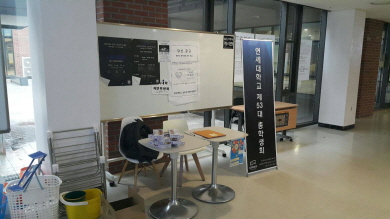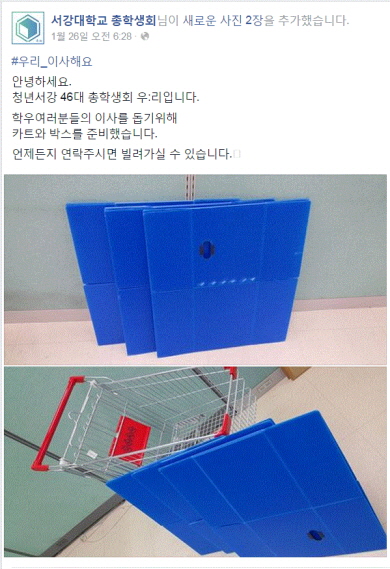
In recent decades, there has been a steady decline of movements by university student unions that were once prevalent in the 1990s. At the same time, there has been a great change in the role of today’s university student unions. Rather than pursuing certain ideologies, their goal has been changed to provide helpful services for a convenient campus life.
Some particular activities that have been promoted by student unions are providing snacks during exam periods as well as giving students the opportunity to express their dissatisfaction. Moreover, student unions have been managing school bus services and helping students look for rooms to live in. More recently, attempts have been made to expand the range of services beyond the aforementioned ones, evolving into services that are more focused on actual student welfare.
Recently, Yonsei University’s new student union, Collabo, has started a service called “Moving Collabo.” This is a service of transferring luggage from Songdo campus to Sinchon campus at the price of 20,000 won, which is cheaper than general moving companies. This relatively cheap price is possible because the luggage of many students who have similar destinations in the campus are gathered to be transported together.

In addition to “Moving Collabo,” the union plans to introduce “Collabo Market,” where students transferring from Songdo to Sinchon campus can donate or sell some of their used items to freshmen coming to Songdo campus. This way, students both moving in and out can be benefited. The goods have been organized, and the union is now preparing for the upcoming opening day of the market in the beginning of March. Lastly, Collabo is also planning to adopt a service in the upcoming semester that delivers fruit to students who miss breakfast.
“I am thankful for the student union because they always try to establish helpful systems for students,” said Moon Seung-won, a sophomore Yonsei University student. “I think ‘Collabo Market’ will be one of the most efficient and helpful one among the services it offers.”
Some other university student unions are focusing on providing necessities and helpful knowledge about school life. Sogang University’s student union, “Oursogang,” for instance, has promoted the availability of umbrellas, scientific calculators and the student union room on the main screen of the student union website. When students access the website, they can immediately view this information. Also, the union has begun to provide boxes and carts to students living in the dormitory for packing and moving their luggage.
Similarly, Seoul National University’s student union has published guidebooks written by a student to give tips for those who live apart from their families. As the book became popular on the school student community website, the union decided to publish the books and provide them to freshmen.
Another university student union has worked to improve the school’s systems regarding credits and courses. Not long ago, Hongik University’s student union succeeded in negotiating with the school to initiate a new credit system. As a result, the school decided to adopt a system in which students can save their credits for the next semester if they have not taken the maximum number of credits in the previous term. With this system, which will begin this March, students will be able to register for a maximum of three credits they saved from the previous semester in next semester. The union is also gathering students’ opinions about adopting “e-learning” for students who are performing military service so that they are able to continue their education while they serve. This system has been implemented by more than 100 universities in Korea, but Hongik University has not yet adopted it.
The student union of Hongik University continues to communicate with students and explore ideas for better academic options.
“The problem of my school is that only a maximum of 19 credits are allowed in one semester, which is too restrictive for students majoring in subjects like Business Administration that require a minimum of 140 credits to graduate,” said Kim Kyung-mean, a junior of Hongik University student. “However, I would like to point out that the student union has recognized this problem and asked for students’ opinions before making it known to the school administration. I think students feel that they now have an effective means of communication with the student union because of this.”

